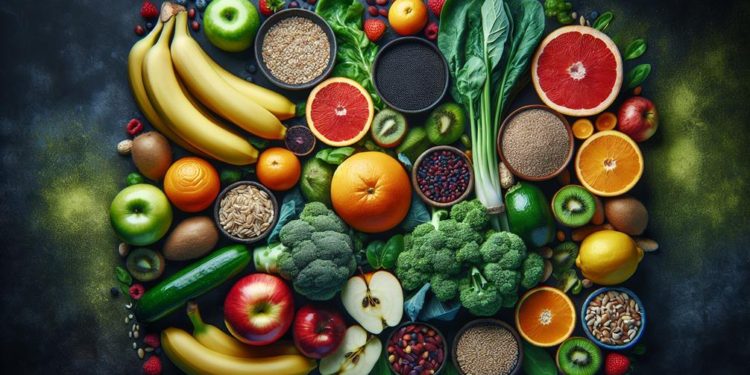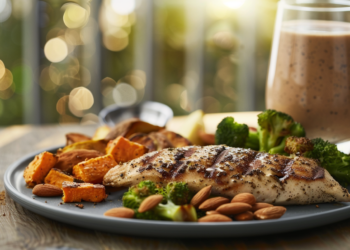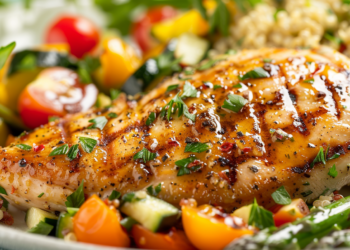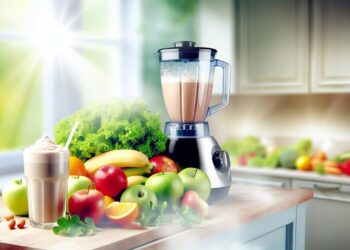You've tried countless diets, attempted various workout regimens, and even resorted to extreme measures, but the scale just won't budge. Frustration sets in as you wonder what you're doing wrong. Well, fear not, because when it comes to weight loss, the key lies in understanding the science behind it. In this discussion, we will explore the nutrition strategies that can pave the way to your success. From decoding calories and energy balance to the role of macronutrients, portion control, incorporating whole foods, managing sugar and carbohydrate intake, and the power of mindful eating – we will uncover the secrets to achieving lasting results.
Key Takeaways
- Caloric deficit is crucial for weight loss, but extreme restrictions or excessive exercise can be harmful.
- Increasing protein intake can aid in weight loss and maintenance due to its higher thermic effect and increased satiety.
- Portion control plays a vital role in regulating calorie intake and preventing overeating, leading to a calorie deficit necessary for weight loss.
- Incorporating whole foods, such as fruits, vegetables, and whole grains, into the diet provides essential nutrients, fiber, and supports weight management.
Understanding Calories and Energy Balance
To effectively manage your weight, it is crucial to understand the concept of calories and energy balance. Maintaining a caloric deficit is key to losing weight, as it means you are consuming fewer calories than your body needs for daily activities. When you create a caloric deficit, your body is forced to use stored energy (in the form of fat) to make up for the energy shortfall. This leads to weight loss over time.
Your metabolic rate plays a crucial role in energy balance. It refers to the number of calories your body needs to perform its basic functions, such as breathing, digesting food, and circulating blood. Each person's metabolic rate is unique and influenced by various factors, including age, gender, body composition, and activity level.
To increase your caloric deficit and promote weight loss, you can focus on two main strategies: reducing calorie intake through a balanced and portion-controlled diet, and increasing calorie expenditure through regular exercise. By combining these approaches, you create a larger energy gap, resulting in a more significant caloric deficit.
It is important to note that extreme caloric restriction or excessive exercise can be detrimental to your health. It is recommended to aim for a moderate caloric deficit of 500-1000 calories per day, which can lead to a safe and sustainable weight loss of 1-2 pounds per week.
The Role of Macronutrients in Weight Loss
Understanding the role of macronutrients is essential for effective weight loss. When it comes to protein intake, research suggests that increasing protein consumption can help with weight loss and weight maintenance. Protein has a higher thermic effect compared to carbohydrates and fats, meaning that your body burns more calories digesting and metabolizing protein. Additionally, protein helps to increase satiety, which can lead to reduced calorie intake and better appetite control. Aim to include lean sources of protein such as chicken, fish, tofu, and legumes in your meals and snacks.
Contrary to popular belief, dietary fat is not the enemy when it comes to weight loss. In fact, including healthy fats in your diet can be beneficial for weight management. Fats are more calorie-dense than protein and carbohydrates, which means that they provide a greater feeling of satiety and can help to curb cravings. However, it is important to choose healthy sources of fat, such as avocados, nuts, seeds, and olive oil, and to consume them in moderation.
Importance of Portion Control
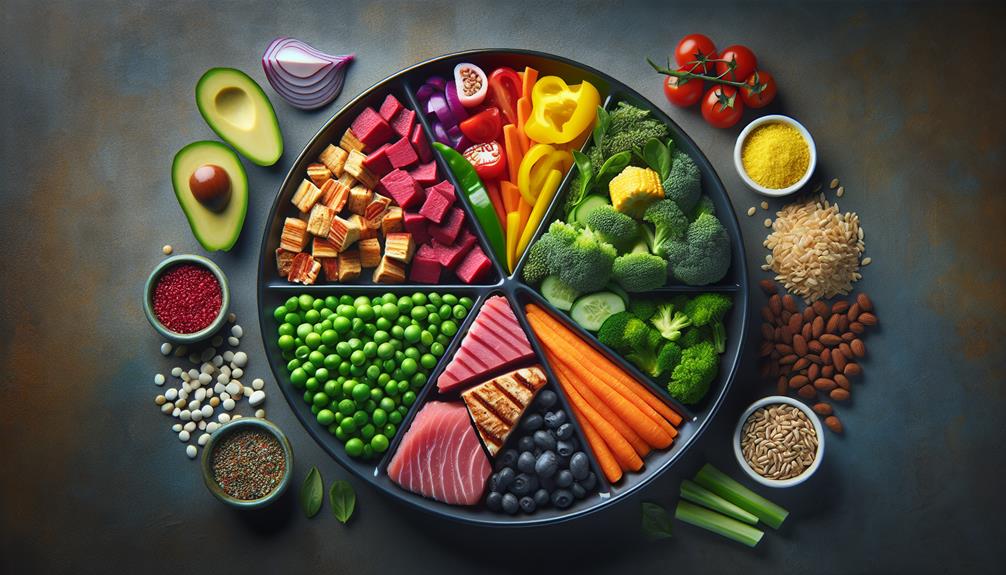
Increasing protein intake and choosing healthy sources of fat are important components of a weight loss strategy, but another key element to consider is the importance of portion control. Portion control refers to the practice of eating appropriate amounts of food to meet your nutritional needs without overeating. It is a crucial aspect of weight loss because it helps regulate calorie intake and prevents excessive energy consumption. By controlling portion sizes, you can achieve a calorie deficit, which is necessary for weight loss.
Portion control offers several benefits for weight management. Firstly, it helps prevent overeating by promoting mindful eating habits and reducing the temptation to indulge in large portions. Secondly, it allows you to enjoy a wide variety of foods while still maintaining a calorie deficit. By including all food groups in appropriate portions, you can meet your nutritional needs while losing weight. Thirdly, portion control provides a practical and sustainable approach to weight loss. Instead of relying on restrictive diets, it focuses on moderation and balance, making it easier to maintain in the long run.
To incorporate portion control into your weight loss strategy, there are various techniques you can use. One effective method is to use smaller plates and bowls, as this visually reduces portion sizes. Another technique is to measure or weigh your food to ensure accurate portion sizes. Additionally, practicing mindful eating by paying attention to hunger and fullness cues can prevent overeating. It is also beneficial to plan and prepare meals in advance, as this allows for better portion control. By implementing these techniques, you can achieve successful weight loss while still enjoying your favorite foods in appropriate portions.
Incorporating Whole Foods Into Your Diet
Incorporating whole foods into your diet is a fundamental aspect of a nutritionally balanced and sustainable weight loss strategy. Whole foods, as opposed to processed foods, are rich in essential nutrients and fiber, which can help promote satiety, regulate blood sugar levels, and support overall health. Here are four practical ways to incorporate whole foods into your diet:
- Choose plant-based alternatives: Opt for plant-based protein sources such as beans, lentils, tofu, and tempeh instead of animal-based proteins. These options are not only lower in saturated fat but also provide important nutrients like fiber, vitamins, and minerals.
- Prioritize fruits and vegetables: Make sure to include a variety of colorful fruits and vegetables in your meals. These nutrient-dense foods are low in calories and high in vitamins, minerals, and antioxidants that support overall health and weight management.
- Emphasize whole grains: Replace refined grains like white bread and pasta with whole grain alternatives such as quinoa, brown rice, and whole wheat bread. Whole grains provide more fiber and nutrients, promoting feelings of fullness and aiding in weight loss.
- Practice meal prepping: Plan and prepare your meals in advance to ensure that you have wholesome options readily available. This can help you make healthier choices and avoid relying on processed convenience foods.
Managing Sugar and Carbohydrate Intake
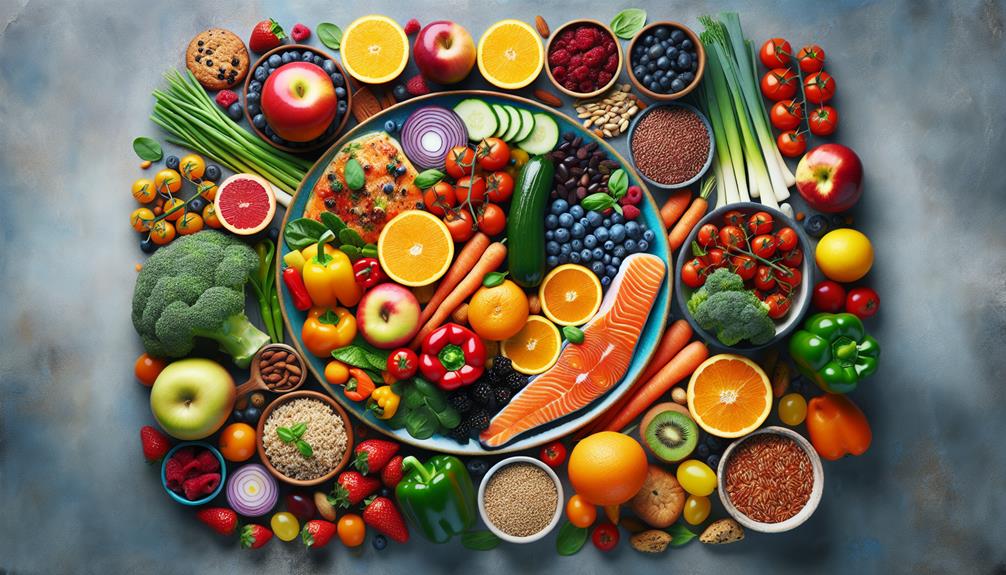
To effectively manage your sugar and carbohydrate intake for weight loss, it is important to implement strategies that prioritize nutrient-dense foods and mindful consumption. One effective strategy is to track your progress by keeping a food diary or using a mobile app that allows you to record your daily carbohydrate and sugar intake. This can help you become more aware of the types and amounts of carbohydrates and sugars you are consuming, enabling you to make informed choices and adjustments as needed.
When it comes to managing sugar intake, opting for sugar substitutes can be a helpful tool. Sugar substitutes, such as stevia, erythritol, and monk fruit extract, provide a sweet taste without the added calories and carbohydrates of regular sugar. However, it is important to use these substitutes in moderation and be mindful of any potential gastrointestinal effects they may have.
In terms of carbohydrate intake, it is beneficial to focus on consuming complex carbohydrates that are high in fiber, such as whole grains, legumes, and vegetables. These types of carbohydrates are digested more slowly, providing a steady release of energy and helping to keep you feeling full for longer periods.
The Power of Mindful Eating
One effective method for promoting weight loss and improving overall eating habits is through the practice of mindful eating. Mindful eating techniques involve paying attention to the present moment and being fully aware of your food choices and eating behaviors. By incorporating mindful eating into your daily routine, you can experience various benefits that can positively impact your weight loss journey.
Here are four key benefits of conscious food choices:
- Enhanced portion control: Mindful eating encourages you to listen to your body's hunger and fullness cues. By eating slowly and savoring each bite, you become more attuned to your body's signals, allowing you to eat until you are satisfied and avoid overeating.
- Increased enjoyment of meals: When you eat mindfully, you engage all your senses in the eating experience. You appreciate the flavors, textures, and aromas of your food, enhancing your overall enjoyment and satisfaction.
- Improved digestion: Mindful eating promotes better digestion by encouraging you to chew your food thoroughly. This aids in breaking down food particles, allowing for more efficient nutrient absorption.
- Emotional well-being: Mindful eating helps you develop a healthier relationship with food, reducing emotional eating tendencies. By being aware of your emotional state and mindful of your food choices, you can make conscious decisions that support your overall well-being.
Incorporating mindful eating techniques and making conscious food choices can be powerful tools in your weight loss journey. By practicing mindfulness, you can create a more sustainable and enjoyable approach to eating, ultimately leading to long-term success.
Frequently Asked Questions
What Is the Recommended Daily Caloric Intake for Weight Loss?
To achieve weight loss, it is recommended to consume fewer calories than your body needs. This can be achieved through healthy meal plans and tracking progress to ensure you are on the right track.
How Does the Body Metabolize Different Macronutrients?
Your body metabolizes different macronutrients, such as carbohydrates, proteins, and fats, through various pathways. Hormones play a crucial role in regulating macronutrient metabolism by signaling the body to prioritize certain fuel sources for energy production.
Is It Necessary to Count Calories to Achieve Weight Loss Goals?
To achieve weight loss goals, you don't have to count calories like a mathematician. Instead, trust your body's natural intuition and eat mindfully. Combine this with regular exercise to maximize your chances of success.
What Are Some Effective Portion Control Strategies?
To effectively control portions, practice mindful eating and use the plate method. Mindful eating involves paying attention to your body's hunger and fullness cues. The plate method helps you balance your meals by dividing your plate into sections for proteins, grains, and vegetables.
Can I Still Enjoy My Favorite Desserts While Managing Sugar and Carbohydrate Intake?
Yes, you can still enjoy your favorite desserts while managing sugar and carbohydrate intake. There are healthy alternatives available that can satisfy your sweet cravings without derailing your weight loss goals.
Conclusion
In conclusion, by understanding the science of weight loss, we can develop effective nutrition strategies for success. Just as a compass guides a traveler through uncharted territory, our knowledge of calories, macronutrients, portion control, and mindful eating can steer us towards our weight loss goals. These strategies act as a powerful tool, illuminating our path to a healthier lifestyle. With dedication and discipline, we can navigate through the complexities of nutrition and achieve long-term weight loss success.


